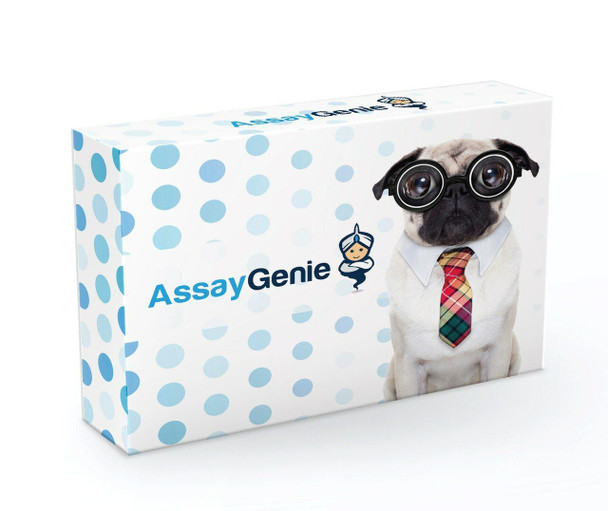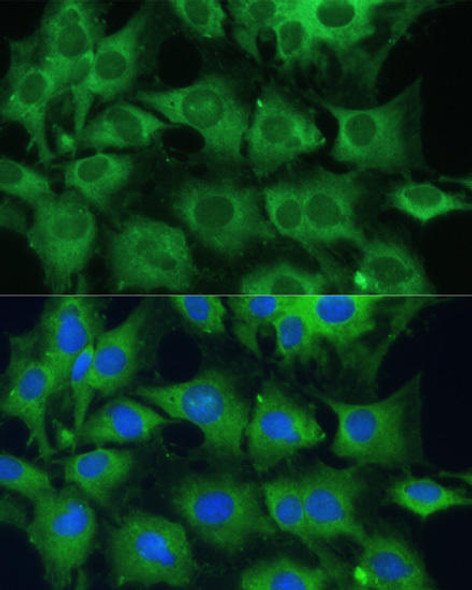Autophagy Antibodies
Anti-PTPN22 Antibody (CAB17128)
- SKU:
- CAB17128
- Product Type:
- Antibody
- Reactivity:
- Human
- Reactivity:
- Mouse
- Reactivity:
- Rat
- Host Species:
- Rabbit
- Isotype:
- IgG
- Antibody Type:
- Polyclonal Antibody
- Research Area:
- Autophagy
Description
| Antibody Name: | Anti-PTPN22 Antibody |
| Antibody SKU: | CAB17128 |
| Antibody Size: | 20uL, 50 uL |
| Application: | WB |
| Reactivity: | Human, Mouse, Rat |
| Host Species: | Rabbit |
| Immunogen: | Recombinant fusion protein containing a sequence corresponding to amino acids 1-90 of human PTPN22 (NP_036543.4). |
| Application: | WB |
| Recommended Dilution: | WB 1:500 - 1:2000 |
| Reactivity: | Human, Mouse, Rat |
| Positive Samples: |
| Immunogen: | Recombinant fusion protein containing a sequence corresponding to amino acids 1-90 of human PTPN22 (NP_036543.4). |
| Purification Method: | Affinity purification |
| Storage Buffer: | Store at -20°C. Avoid freeze / thaw cycles. Buffer: PBS with 0.02% sodium azide, 50% glycerol, pH7.3. |
| Isotype: | IgG |
| Sequence: | MDQR EILQ KFLD EAQS KKIT KEEF ANEF LKLK RQST KYKA DKTY PTTV AEKP KNIK KNRY KDIL PYDY SRVE LSLI TSDE DSSY INAN FI |
| Gene ID: | 26191 |
| Uniprot: | Q9Y2R2 |
| Cellular Location: | |
| Calculated MW: | 20kDa/75kDa/78kDa/85kDa/88kDa/91kDa |
| Observed MW: | Refer to figures |
| Synonyms: | PTPN22, LYP, LYP1, LYP2, PEP, PTPN22.5, PTPN22.6, PTPN8 |
| Background: | This gene encodes of member of the non-receptor class 4 subfamily of the protein-tyrosine phosphatase family. The encoded protein is a lymphoid-specific intracellular phosphatase that associates with the molecular adapter protein CBL and may be involved in regulating CBL function in the T-cell receptor signaling pathway. Mutations in this gene may be associated with a range of autoimmune disorders including Type 1 Diabetes, rheumatoid arthritis, systemic lupus erythematosus and Graves' disease. Alternatively spliced transcript variants encoding distinct isoforms have been described. |
| UniProt Protein Function: | PTPN22: Seems to act on Cbl. May play a role in regulating the function of Cbl and its associated protein kinases. Acts as negative regulator of T-cell receptor (TCR) signaling. Dephosphorylates and inactivates the SRC family kinases. Interacts with CSK. Interacts with LPXN. Predominantly expressed in lymphoid tissues and cells. Isoform 1 is expressed in thymocytes and both mature B and T-cells. Down-regulated by phosphorylation. Belongs to the protein-tyrosine phosphatase family. Non-receptor class 4 subfamily. 5 isoforms of the human protein are produced by alternative splicing. |
| UniProt Protein Details: | Protein type:Protein phosphatase, tyrosine (non-receptor); Motility/polarity/chemotaxis; EC 3.1.3.48 Chromosomal Location of Human Ortholog: 1p13.2 Cellular Component: cytoplasm; internal side of plasma membrane; nucleus; perinuclear region of cytoplasm Molecular Function:kinase binding; phosphoric monoester hydrolase activity; protein binding; protein tyrosine phosphatase activity; SH3 domain binding; ubiquitin protein ligase binding Biological Process: lipopolysaccharide-mediated signaling pathway; negative regulation of autophagy; negative regulation of JNK activity; negative regulation of T cell activation; negative regulation of T cell receptor signaling pathway; negative regulation of tumor necrosis factor production; positive regulation of interferon type I production; positive regulation of toll-like receptor 3 signaling pathway; positive regulation of toll-like receptor 4 signaling pathway; protein amino acid dephosphorylation; regulation of innate immune response; regulation of natural killer cell proliferation; response to lipopolysaccharide; T cell differentiation Disease: Diabetes Mellitus, Insulin-dependent; Rheumatoid Arthritis; Systemic Lupus Erythematosus |
| NCBI Summary: | This gene encodes of member of the non-receptor class 4 subfamily of the protein-tyrosine phosphatase family. The encoded protein is a lymphoid-specific intracellular phosphatase that associates with the molecular adapter protein CBL and may be involved in regulating CBL function in the T-cell receptor signaling pathway. Mutations in this gene may be associated with a range of autoimmune disorders including Type 1 Diabetes, rheumatoid arthritis, systemic lupus erythematosus and Graves' disease. Alternatively spliced transcript variants encoding distinct isoforms have been described. [provided by RefSeq, Mar 2009] |
| UniProt Code: | Q9Y2R2 |
| NCBI GenInfo Identifier: | 20139861 |
| NCBI Gene ID: | 26191 |
| NCBI Accession: | Q9Y2R2.2 |
| UniProt Secondary Accession: | Q9Y2R2,O95063, O95064, Q6IPX8, Q8WVM1, A0N0K6, B1ALC8 D4NZ71, E9PLD8, E9PPI1, |
| UniProt Related Accession: | Q9Y2R2 |
| Molecular Weight: | 75,488 Da |
| NCBI Full Name: | Tyrosine-protein phosphatase non-receptor type 22 |
| NCBI Synonym Full Names: | protein tyrosine phosphatase, non-receptor type 22 |
| NCBI Official Symbol: | PTPN22 |
| NCBI Official Synonym Symbols: | LYP; PEP; LYP1; LYP2; PTPN8 |
| NCBI Protein Information: | tyrosine-protein phosphatase non-receptor type 22 |
| UniProt Protein Name: | Tyrosine-protein phosphatase non-receptor type 22 |
| UniProt Synonym Protein Names: | Hematopoietic cell protein-tyrosine phosphatase 70Z-PEP; Lymphoid phosphatase; LyP; PEST-domain phosphatase; PEP |
| Protein Family: | Tyrosine-protein phosphatase non-receptor |
| UniProt Gene Name: | PTPN22 |
| UniProt Entry Name: | PTN22_HUMAN |






